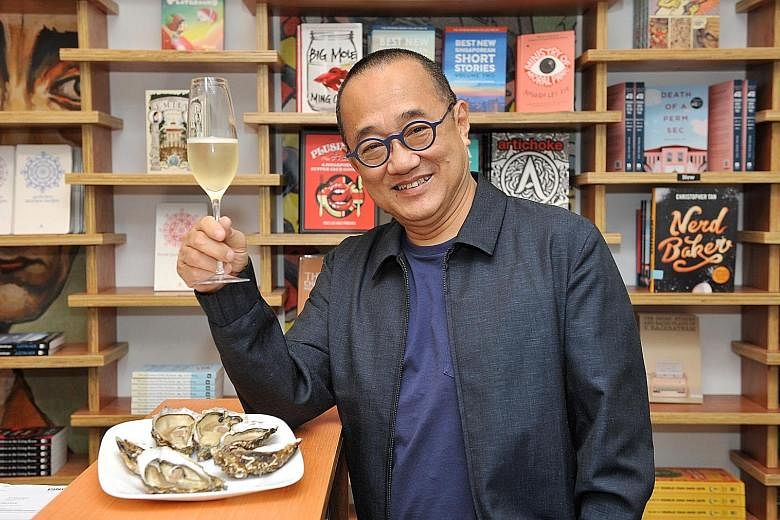Epigram Books chief executive officer Edmund Wee, 63, publishes only books that reflect his interests - literature, food and design.
He says: "Literature because I like reading. Food, not because I like to dine out, but because I like to cook, which I find relaxing and creative. We also publish some design and photography books, but not many because they're costly to do and there's not a big market."
The former journalist and design editor of The Straits Times set up design company Epigram in 1991 after leaving the newspaper. Publishing came about by accident when some clients asked him to help publish coffee-table books for their companies because of his journalism background. One book led to another and Epigram Books was launched as a separate company in 2011.
He has since published more than 250 books because, he says, "while quality is important, you need to ramp up the numbers, especially in the early years".
"If you publish just three to five books a year, it'll take you 20 years to publish 100 books. Twenty years is too long. So I think it's important to get the books out."
-
WHAT WOULD YOUR LAST MEAL BE?
-
Oysters and champagne. Oriana Fallaci, a famous Italian journalist, when diagnosed with cancer and left with just a few months to live, was told by the doctor that she could have only a liquid diet. She said: "That's okay, I'll have champagne every day."
I like bubbly too. I can't afford the more expensive champagne, but prosecco would be good enough. And it goes so well with oysters.
His latest venture is an online bookstore called localbooks.sg selling only Singapore books. It is set to be launched next month, with about 6,000 titles from Singapore publishers, including Marshall Cavendish, NUS Press, Ethos Books and, of course, Epigram Books.
"It'll be a one-stop place to buy local books," he says.
Next month will also see the launch of Now That It's Over, a novel by O Thiam Chin, who won the inaugural Epigram Books Fiction Prize. The $20,000 book prize, which Mr Wee set up last year to encourage local writing, is Singapore's biggest for fiction.
He is married to Ms Tan Wang Joo, 67, a former journalist, and they have a daughter, Yi Zhen, 23, and a son, Zhen Yang, 22.
What has your experience with publishing food books been like?
I thought that perhaps they would be more profitable than literature books because Singaporeans are crazy about food. But I'm not sure they are, because food books are not cheap to produce. They're big and colourful with photos, so the cost of production is high.
The other problem with cookbooks is that you need an editor who knows about food. Otherwise when you read a recipe, you won't know if something is wrong.
We have had a couple of editors, but they've left. Because we don't have a food editor now, we're publishing only one cookbook this year, Don't Leave Home Without Your Chilli Sauce by Constance Singam. It's more of a food memoir of her growing up and the food she and her family cooks. It's targeted to be out by October or November.
Do you eat out much?
I don't go to fancy restaurants because they're too expensive and the stiff atmosphere makes them hard to enjoy. I'm a casual person and I wear T-shirts most of the time.
The last fancier place I ate at is The Naked Finn, which is not too bad and it's not super expensive.
My favourite is hawker food, mainly at Ghim Moh food centre near where I live. I used to like the Tai Hwa bak chor mee there, but it has closed. The food centre is famous for duck rice, hor fun and chye tow kway, but they all have long queues and I don't like queues. Still, I'm there at least once a week on weekends.
On weekdays, I usually have simple meals. Breakfast is muesli with yogurt, lunch is fish soup near my office and dinner is a salad.
On Saturday nights, I take my wife and children out, but we don't go to expensive places. Sunday night is when I cook for the family. That's the time to experiment and the family are my guinea pigs. I tend to cook Western dishes, but the wife has been complaining and asking why don't I cook local food.
Where do you get your ideas from?
Either from a book or the newspaper or something I have seen. If I eat something I like, I'd try cooking it. Once I was taken to Justin Quek's restaurant Sky On 57 in Marina Bay Sands and had a dish of chilli crab in pumpkin soup. I've been able to replicate that and have served it at some dinners.
A dish I do quite regularly is the braised pork belly that I read in the Momofuku cookbook. I made my own variation by adding scallion sauce. I like that a lot and I cook it quite often when I entertain.
Another is a recipe for chicken soup in Sam Leong's cookbook. It is so simple and brilliant that I tried it and it's really very nice. Now I use it as a base for other dishes. For example, I added cod with tung-o vegetable and it turned out very well.
I also do a mushroom soup from a recipe by Anthony Bourdain, which adds good-quality sherry and it's really very nice. There's no milk or cream, just mushrooms, but it tastes like cream of mushroom soup. Fortunately, I have a wife and daughter who are my most severe critics. If the dish is lousy, they'll be sure to tell me not to do it again. That's good, I find that very useful.
Your friends will never tell you the truth because they want to be invited back.
What did you cook recently?
Two nights ago, I made fishhead curry without fishhead, but with fish fillet because a friend wanted to eat the dish but doesn't like the head. I used a brand of curry powder called Baba's that's very good.
And when the dinner guest asked Wang Joo which eatery she would go to eat fishhead curry, she said: "Why would I want to eat fishhead curry outside when my husband makes the best?"
How did you start cooking?
My mother was a great cook. When I was young, I used to go into the kitchen to watch her cook, but she would chase me out because of the old-fashioned idea that sons didn't have to learn to cook.
Then I went overseas to study and had to cook a bit, but it was nothing major.
What changed was because of Jamie Oliver. I watched his TV show, The Naked Chef, at the end of the 1990s and it was so enjoyable. He made cooking so simple, it was "agak-agak", no measuring. I started cooking after watching the show and went on from there.
Another reason was that at the time, my wife and I moved into a new home with a more spacious and modern kitchen. I decided that since I had a nice kitchen, why don't I try cooking?
It was also a kitchen without any fire, because I wanted to encourage the children to learn to cook too. So it had just induction hobs.
Not that it worked. My two children didn't cook because their father did everything.
Who do you cook for besides your family?
It is a family tradition that during Chinese New Year and Christmas, the rest of my extended family would gather at my house because I'm the eldest son. There would be 20 or more people and I would cook for them.
What do you cook at these gatherings?
For Chinese New Year, it would frequently be Peranakan food - dishes such as bakwan kepiting and ayam buah keluak - because my father was Peranakan. For Christmas, it would be turkey.
Also, at Epigram Books, we have a pop-up sale two or three days before Christmas and customers who turn up would get free turkey and ham that I cook for the staff, who have to work late.
What was the biggest group of people you cooked for?
When my son was in school, for Teachers' Day one year, the Parents Teachers Association suggested that parents cook a sit-down lunch for the teachers. I made mushroom soup and a pasta dish for 100 teachers.
If you could choose anyone in the world to have a meal with, who would that be?
Holly Golightly, a fictional character from Truman Capote's novella, Breakfast At Tiffany's. She's such a spirited person and quite antiestablishment. I'd love to meet somebody like that.
Correction Note: An earlier version of this story mentioned that the Epigram Books Fiction Prize was worth $2,000. This is incorrect. It should be $20,000. We are sorry for the error.


